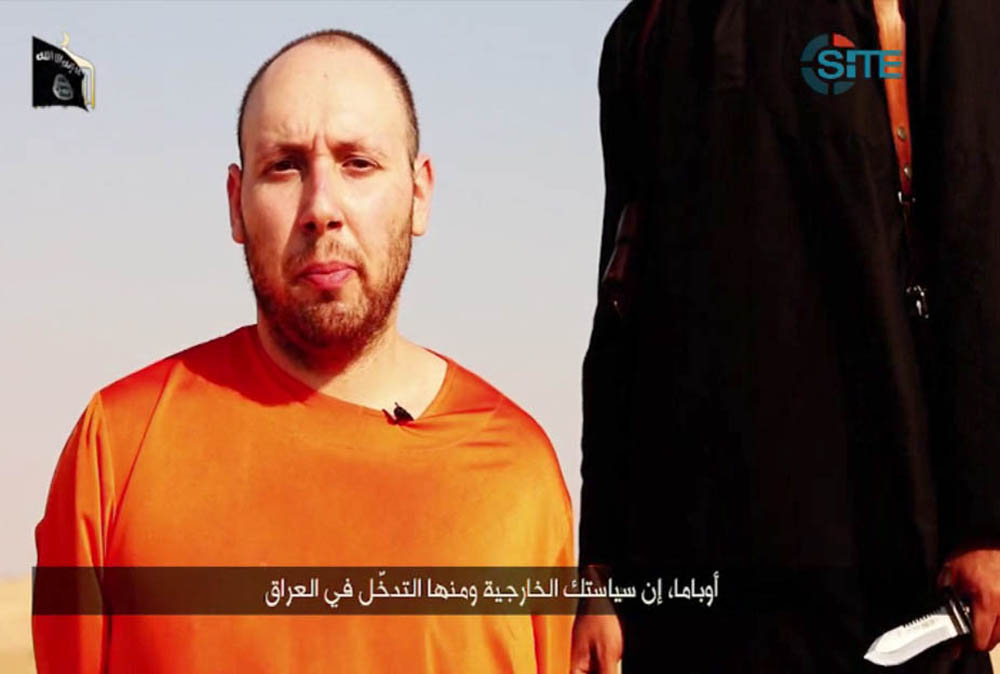Airman Kevin Haggith is part of US operations in Iraq.
ANALYSIS
The world’s most potent terror group is also its most savvy. In its 18-month existence, Isis has imposed its fundamentalism on the world using very modern means. Slick production, an eye for a camera angle and high-definition horror have done as much to showcase the group – and further its aims – as its rampage across Iraq and Syria.
Almost every move Isis has made has been chronicled in some form, either on shaky cellphones or with slicker production values. An hour-long chronology of barbarism that the group posted online in June featured an opening sequence copied straight from the 2009 film about the Iraq war, The Hurt Locker.
Isis may eschew much of the modern world, but it certainly studies its enemy. In what is the biggest punt of its bloody life, the group appears to have gambled that it can call the bluff of its most formidable foe.
On extremist web forums and within the organisation, debate is raging about how the United States will respond to the beheading of two of its citizens. A growing school of thought is that the gruesome deaths of James Foley and Stephen Sotloff have done what three blood-soaked years in Syria and Iraq had failed to do: galvanise war-weary Western leaders and their sceptical publics to acknowledge a common and fast-growing enemy that may eventually point its turrets their way.
Opponents of the brazen violence say that although such tactics have a strong terror shock value among communities they want to conquer, they also stir sleeping giants. And if Isis is to continue its quest for dominance, having superpowers collectively enraged so soon might not help further such goals.
Enormous momentum
The group has enormous momentum; militarily, it is manoeuvring on three fronts at once – something far beyond the capabilities of the Iraqi and Syrian armies. It is collecting large numbers of Sunnis on both sides of the now redundant border. Some are being press-ganged, others are joining from fear, and a smaller number from a conviction that the jihadis share their values and are acting out preordained prophecies.
Whatever their motivation, Iraq’s Sunni minority has shared a common sense of being estranged from any semblance of political process ever since Saddam Hussein was ousted in Iraq and Shia Islamic Iran established itself as a post-occupation power. Syria’s Sunni majority has been partly subservient to a Shia-aligned Alawite regime for three decades longer. Together they make a formidable support base.

Isis followers beheaded Steven Sotloff. (Site Intelligence Group, HO, AFP)
Those in favour of less confrontation say that Isis needs this stunning progress to continue if it is to make good its goal of re-establishing a caliphate across ancient Islamic lands.
With a new caliphate declared, the next step will be decided by the self-styled caliph, Abu Bakr al-Baghdadi, and a tightly knit military council. Some who study Isis closely say Baghdadi is aiming for an apocalyptic showdown that he wants to bring on sooner.
Interpretations of Qur’anic teachings underpin all that he does. High on the list of teachings Isis adheres to is a 1?400-year-old prediction that Muslims and Christians will fight a pre-apocalyptic battle in a place called Dabiq. Since establishing themselves as a force in northern Syria in May 2013, Isis members have focused on a small hamlet of 4?000 people about 50km south of the Turkish border, called Marj Dabiq. This, to many among Isis, is ground zero of the war, a place where ancient prophecies will be thrashed out in an existential battle between the faiths.
“Baghdadi wants to bring the Americans into a war with him so he will prove what was written in the Qur’an and the prophecies that Crusaders will fight against the Muslims,” said a leading Iraqi expert on Isis, Hisham al-Hashimi.
“He wants to prove that he is the leader of Muslims. Having the Americans bomb him is not at odds with spreading the caliphate. His dream is a real jihad against the Crusaders.” – © Guardian News & Media 2014